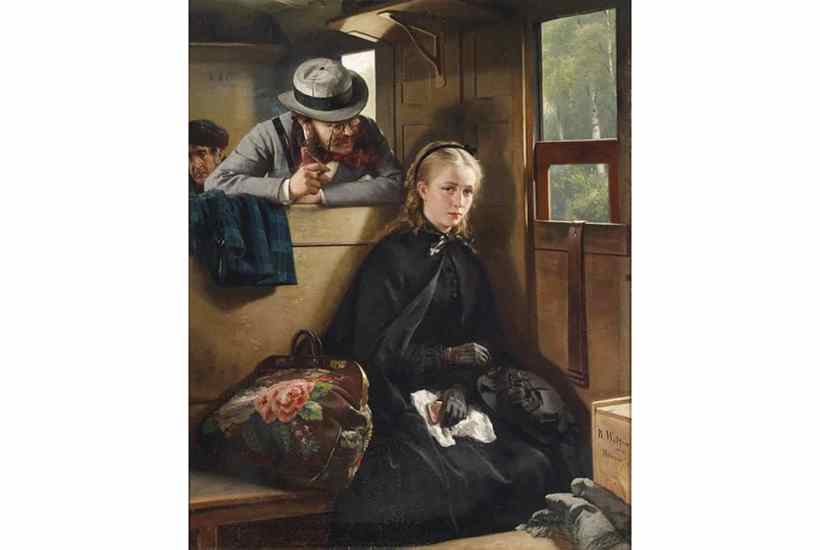Like many people, I enjoy watching people. There’s a great pleasure in sitting in a café or on a park bench on a sunny afternoon and just watching people pass by. But increasingly, people-watching is becoming suspect, and even criminalised.
The latest and most worrying example is Transport for London’s campaign against what it calls ‘intrusive staring’. Posters all over the Tube now warn us: ‘Intrusive staring is a form of sexual harassment and will not be tolerated.’ Last month a man was sentenced to 22 weeks in prison after a woman reported him for ‘continuously staring’ at her on a train in Berkshire. Sarah White, leader of British Transport Police’s sexual offences team, has urged anyone who feels intrusively stared at to report it.
But what exactly is ‘intrusive staring’? Talking to representatives for both TfL and the British Transport Police, I discovered that there is no clear, objective definition. They say the line is crossed when a man looks at a woman in a sexual way that makes her feel ‘unsafe’ or ‘uncomfortable’. Those who experience intrusive staring – or who witness such acts – are asked to report the incident to the police with the view of an arrest and prosecution under the Public Order Act. But how many seconds or minutes does it take to turn a look of curiosity into an intrusive stare? No one knows. And one woman’s intrusive stare could be another’s welcome invitation to romance.
Of course, everyone must surely support TfL’s current campaign against such sexual acts of harassment as touching, upskirting, catcalling and indecent exposure. Yet the criminalisation of looking at other people in a public space is worrying. Of course nobody wants to defend men who stare at women’s breasts with their tongues hanging out like panting dogs. Or men who deliberately set out to intimidate women with long and menacing stares. But are there really so many men like this lurking on the London Underground?
All of my female friends have stories about creepy men pressing up against them, copping a feel or making lewd comments on the Tube. But I’ve never heard them complain about inappropriate staring. And yes, some of them have been stared at, but for them it’s not a big deal. As one young, much stared-at beauty told me: ‘Surprise surprise, men look at sexy women.’
For the purposes of research I went on a Tube ride to stare at women – and yes, I know how weird that sounds. At any sign of discomfort I would immediately have stopped. But believe me, staring – sexual or otherwise – is not an easy thing to do. Most men are too wimpy to make eye contact. We are socialised not to let our eyes linger, first by our parents – ‘It’s rude to stare!’ – and then by the #MeToo activists – ‘It’s sexism to stare!’
I tried a mix of stares – my best sexy stare, my pervy bloke stare and my just-escaped-from-the-mental-hospital stare – each for at least 30 seconds. I got one titter, one smile and one roll of the eyes. Most women did not notice I was staring. Why? Because on Tubes most women – and men – are so busy staring at their phones that they don’t pay attention to what anybody else is doing.
Nobody, except sex pests and pervs, wants to make women feel unsafe or uncomfortable. The problem is that some women are so sensitive to the most unobtrusive acts of male interest – ‘sexual microaggressions’ as they’re called – that any flicker of attention is branded a form of harassment.
You might think that the practical difficulties of catching an obtrusive starer makes prosecution almost impossible. But a spokesman for British Transport Police assured me: ‘We have plenty of CCTV cameras and information from Oyster cards to aid us.’
But can we legislate against the gravitational force of a beautiful face – either male or female? No, we can’t. The bigger question is: would we want to? I hope not. What a dull, joyless life it would be if we couldn’t enjoy the view of a magnificent smile. In a world where we can’t look at each other with a hint of sexual interest, what happens to love at first sight? It will have to go. And with it hundreds of romcoms and most pop music. Frankie Valli’s ‘My Eyes Adored You’ would have to be changed to: ‘My eyes adored you – for which I’m terribly sorry.’ And out goes Andy Williams and his classic ‘Music to Watch Girls By’.
I confess that I look at attractive women on public transport regularly. And sometimes a look probably lingers a bit too long. I still have the hope that maybe one day those beautiful eyes across from me will look back with pure adoration: the old love-at-first-sight fantasy. Does this make me pathetic? Yes. Does it make me a perv? No.
What I most resent about the notion of intrusive staring is the idea that looking at women always has a sexual element. It’s just not true. It assumes that men are simple, sex-obsessed beasts devoid of human curiosity. On the Tube I look at old women and tired mums and wonder about their lives. And I also look at men. Handsome men. Old blokes. Sad young men. Men who are losing their hair and their looks. By looking deeply, we see into the lives of others. It may spark romance, but it also encourages empathy.
This whole don’t-look-at-women trend is rooted in the notion of toxic masculinity – so when a man looks at a woman it must be for some dark, nasty reason. And yes, sometimes, with some men, it is. But there’s no such thing as toxic masculinity. There are toxic men – and there are toxic women too.
I don’t look at children in public because I fear being branded a ‘paedo’ for doing so. If we’re not careful this same intolerant climate will extend into people-watching – and we will lose one of life’s great pleasures.
Got something to add? Join the discussion and comment below.
Get 10 issues for just $10
Subscribe to The Spectator Australia today for the next 10 magazine issues, plus full online access, for just $10.
You might disagree with half of it, but you’ll enjoy reading all of it. Try your first month for free, then just $2 a week for the remainder of your first year.














Comments
Don't miss out
Join the conversation with other Spectator Australia readers. Subscribe to leave a comment.
SUBSCRIBEAlready a subscriber? Log in